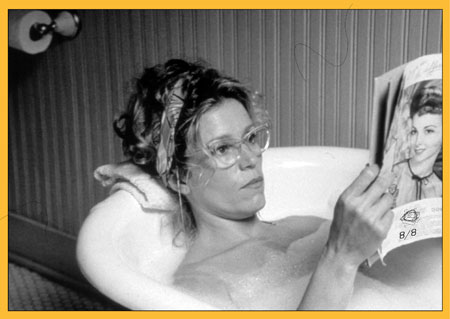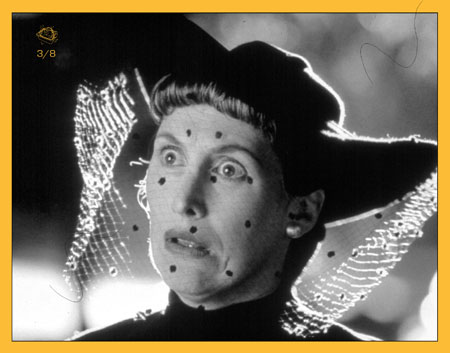The Man Who Wasn´t There, the coen brothers' barber testua: koldo almandoz
As I sit down to write I must confess that I haven't actually seen all of the Coen brothers' last film. I missed it during the last San Sebastian Film Festival and a couple of weeks ago, on the New York-Paris flight, when they put it on as the in-flight movie, I fell asleep halfway through. Now it's not that the film is boring; I was just too tired to stay awake. A question for you. How on earth do you say jet lag in Basque?. (Hegaldi luze batek eragindako neke atzeratua is the answer Mr. Koldo. English is slightly more economical, don't you think? - translator). So, in order to make up for my blatant lack of ethics, I have done an "incredible" amount of research and have come up with the following comments, oddities and bits and pieces on the film. You'll find the results below:
The Coen brothers first got the idea for the script while they were filming "The Hudsucker Proxy". They were filming a scene in a barber shop. They saw a poster on the wall that depicted different hair cuts and styles from the forties. The story is that they then started imaging what a barber responsible for those type of haircuts would be like. All this resulted in the birth of Ed Crance, the Coen brothers' barber.
"Here, as well as visualising a decade - we're talking about the 40s, we wanted to plasmate the post-war fear thta was rife at the time. We wanted to capture the existentialist fear present in the films made during those years. We think there is a connection between the sensation created by what happened on September the 11th and what was felt then."
Joel Cohen.
"Ed Crance is not happy with his life but he just doens't know how to change it."
Ethan Coen.
"Billy Bob Thorton is a really sensitive guy. If we had made this film in 1949, Montgomery Cliff could have played the role. Both him and Billy have a special ability: the capacity to remain passive without actually disappearing. The barber Ed Crance hardly has a conversation throughout the entire film. He thinks first and then reacts. A voice in off is his voice. That's something very few people could do today."
Joel Cohen.
A new project titled "Intolerable Cruelty" will get underway shortly.
Lilac. A colour that has nothing to do with the film but I needed an L to make up the play on words. Speaking of the film and colours, the beautiful black and white used in the film takes the spectator back to the headiest days of film noir. Back to likes of The altese Falcon and The Postman Always Rings Twice (in the half of the film I saw anyway). The film was actually shot in colour and black and white was introduced during the post-production phase.
Doris is Ed Crance's wife. She has other lovers. And Ed will try and make the most of the situation...
Ethan Coen doesn't like to appear on DVDs spouting off his opinions. As he puts it: "When I see a flick, I never stick around at the end to hear what the director has to say. It doesn't make any sense to start giving viewers explanations on the film they've just seen."
The Coen brothers first got the idea for the script while they were filming "The Hudsucker Proxy". They were filming a scene in a barber shop. They saw a poster on the wall that depicted different hair cuts and styles from the forties. The story is that they then started imaging what a barber responsible for those type of haircuts would be like. All this resulted in the birth of Ed Crance, the Coen brothers' barber.
"Here, as well as visualising a decade - we're talking about the 40s, we wanted to plasmate the post-war fear thta was rife at the time. We wanted to capture the existentialist fear present in the films made during those years. We think there is a connection between the sensation created by what happened on September the 11th and what was felt then."
Joel Cohen.
"Ed Crance is not happy with his life but he just doens't know how to change it."
Ethan Coen.
"Billy Bob Thorton is a really sensitive guy. If we had made this film in 1949, Montgomery Cliff could have played the role. Both him and Billy have a special ability: the capacity to remain passive without actually disappearing. The barber Ed Crance hardly has a conversation throughout the entire film. He thinks first and then reacts. A voice in off is his voice. That's something very few people could do today."
Joel Cohen.
A new project titled "Intolerable Cruelty" will get underway shortly.
Lilac. A colour that has nothing to do with the film but I needed an L to make up the play on words. Speaking of the film and colours, the beautiful black and white used in the film takes the spectator back to the headiest days of film noir. Back to likes of The altese Falcon and The Postman Always Rings Twice (in the half of the film I saw anyway). The film was actually shot in colour and black and white was introduced during the post-production phase.
Doris is Ed Crance's wife. She has other lovers. And Ed will try and make the most of the situation...
Ethan Coen doesn't like to appear on DVDs spouting off his opinions. As he puts it: "When I see a flick, I never stick around at the end to hear what the director has to say. It doesn't make any sense to start giving viewers explanations on the film they've just seen."




